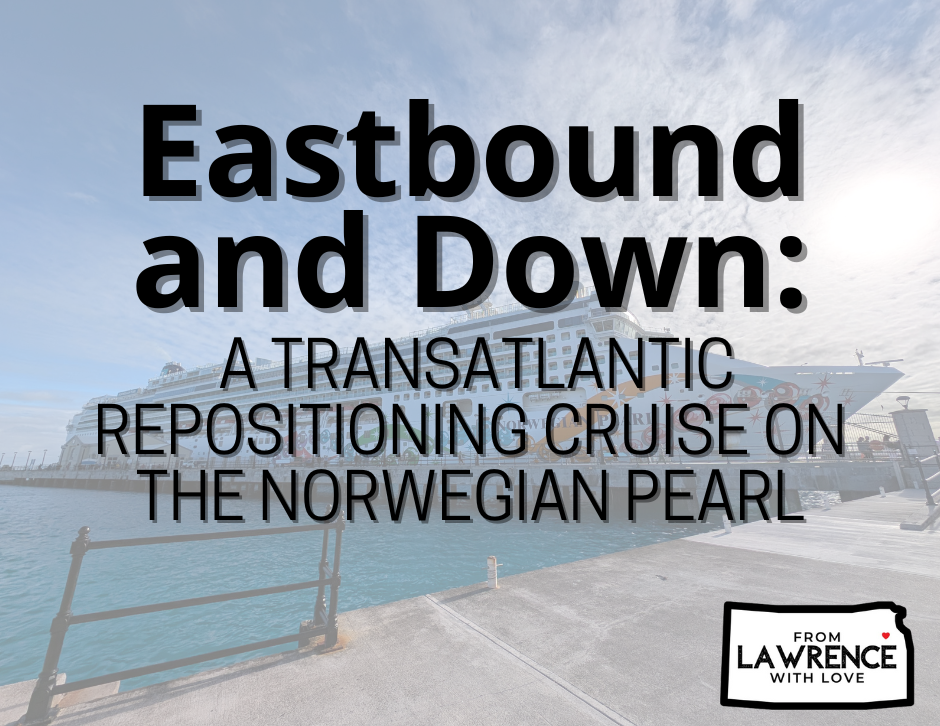From Lawrence with Love: Embracing Sustainable Travel
- Amanda Davis

- Aug 5, 2025
- 6 min read
Updated: Aug 26, 2025

I’ve loved travel for as long as I can remember! Over the years, my husband Josh and I have shared unforgettable moments on planes, trains, road trips, and yes, cruise ships. Whether it’s watching the sun rise over Iceland’s volcanic landscapes or enjoying a cappuccino in a quiet Roman café, travel continues to shape my perspective and enrich my life. But with that joy also comes responsibility.
As a frequent traveler and someone who cruises regularly, I’ve become increasingly aware of the environmental and social impact of our adventures. Tourism brings benefits, but it also comes with a footprint. That awareness has pushed me to make more thoughtful choices and explore ways to travel more sustainably without giving up the experiences that bring me so much joy.
This post is for anyone who wants to explore the world while treading a little more lightly. I’m not claiming to be a perfect eco-traveler - I’m far from it! But I’ve learned a lot, and I’m excited to share realistic tips and ideas that anyone, including fellow cruise lovers, can incorporate.
Why Sustainable Travel Matters
The travel industry plays a powerful role in local economies, global conservation, and cultural exchange. However, it also contributes significantly to greenhouse gas emissions, overuse of natural resources, and sometimes to the displacement or exploitation of local communities. From air travel to plastic waste to cruise ship emissions, our choices as travelers ripple out far beyond our itineraries.
Sustainable travel is about minimizing those negative impacts while maximizing the benefits for the places and people we visit. It’s not about perfection. It’s about progress and making small, smart decisions that add up over time.
What About Cruising?
I cruise often, and I know that raises questions about sustainability. Cruises are an incredible way to see multiple destinations without the hassle of repacking or navigating between cities. They offer access to remote regions and bring tourism dollars to coastal communities. However, there’s no denying that cruise ships have historically had a large environmental footprint.
Fortunately, many cruise lines are making substantial investments in cleaner operations and more sustainable practices. Some of the steps that responsible cruise lines are taking include:
Installing advanced wastewater treatment systems
Using LNG (liquefied natural gas) as a cleaner-burning fuel
Implementing shore power technology that allows ships to plug into local electrical grids instead of idling in port
Eliminating single-use plastics on board
Offering carbon offset programs for guests
Partnering with local organizations for ethical excursions and wildlife protection
Before booking, I now look into a cruise line’s sustainability policies. Companies like Hurtigruten, Norwegian Cruise Line Holdings, and Royal Caribbean Group provide detailed environmental, social, and governance (ESG) reports that outline their efforts. Choosing newer ships, sailing with lines that prioritize green practices, and selecting excursions that support local businesses and conservation initiatives are all ways to cruise more consciously.
Tip 1: Choose Eco-Friendly Accommodations
Not every trip involves a cruise. When traveling by land, one of the easiest ways to reduce your footprint is by staying in eco-conscious accommodations. Look for properties certified by organizations like Green Key, EarthCheck, or LEED. These properties often use renewable energy, recycle water, reduce waste, and support the local economy.
Even if a hotel isn’t certified, check its policies. Do they offer towel reuse programs? Use refillable toiletry dispensers? Compost? Every small choice contributes to a larger impact.
Tip 2: Support Local Businesses
Whether we’re on a cruise excursion or exploring a new city on land, Josh and I make it a point to eat at locally owned restaurants, shop from independent artisans, and book small-group experiences run by local guides whenever possible. This makes the experience more authentic and keeps money in the community.
On cruises, this means skipping the large, touristy shops at the pier and instead walking a bit farther to find a café or boutique run by locals. It also means choosing shore excursions that reflect local culture and support small operators.
Food tours are one of our favorite ways to connect with a destination. Companies like Secret Food Tours and local independent guides often take you far beyond the tourist path while uplifting local vendors and chefs.
Tip 3: Offset Your Carbon Footprint
Cruising, flying, and even driving have emissions that contribute to climate change. While reducing travel isn't always possible or desirable, we can balance our impact by investing in carbon offsets.
You can use platforms like Cool Effect or Sustainable Travel International to support vetted environmental projects that reduce greenhouse gases. These might include reforestation, renewable energy, or methane capture.
Some cruise lines now offer guests the opportunity to offset their sailings. It’s not a perfect solution, but it is a valuable step in a more responsible direction.
Tip 4: Minimize Waste
One of the biggest challenges with cruising and travel in general is plastic waste. Drink cups, straws, water bottles, and packaging add up quickly.
Here’s what I pack to reduce waste wherever I go:
A reusable water bottle (refill at drinking stations or in the gym on cruise ships)
A foldable tote bag for shopping and beach excursions
A stainless steel straw and travel utensils
Refillable silicone toiletry bottles
Some cruise lines now provide refillable water stations or complimentary reusable bottles, but many still do not. Bringing your own helps cut back on single-use plastics dramatically. Virgin Voyages won’t even allow you to bring single-use plastics on their ships at all.
Tip 5: Use Public Transit and Walk More
When I’m not on a ship, I make an effort to explore cities on foot or use public transportation. This is more eco-friendly, more affordable, and often more immersive. We’ve had some of our best travel memories from walking aimlessly through neighborhoods or hopping on a local tram.
If your cruise offers time in a city with good infrastructure, such as Oslo, Vancouver, or Barcelona, skip the organized tour and explore on your own by metro or e-bike.
For land-based trips, we try to rent fuel-efficient or hybrid vehicles, use buses or trains, or build our itineraries around walkable city centers.
Tip 6: Respect Wildlife and Nature
This one is essential! Many cruise excursions offer wildlife encounters or nature tours. While some are run ethically, others exploit animals or damage ecosystems.
Do your research before booking. Ethical wildlife experiences avoid direct contact, prioritize habitat protection, and educate visitors on conservation. Look for excursions certified by reputable organizations, or choose alternatives like national parks, botanical gardens, or marine sanctuaries.
On land, follow “leave no trace” principles. Pack out your trash, stick to trails, and respect local flora and fauna.
Tip 7: Travel in the Off-Season
Cruise ports and popular cities can be overwhelmed in high season, which strains resources and reduces the quality of the experience. Traveling in the shoulder season, such as early spring or late fall, means fewer crowds and a smaller environmental footprint.
We’ve found that off-season travel also brings more authentic interactions with locals. They’re not as rushed, and you’re less likely to be herded along with other tourists. As a bonus, prices are often better too!
Tip 8: Be Curious and Culturally Sensitive
Responsible travel means showing respect to the people and places we visit. Before arriving, we try to learn a bit about the local language (hello Duolingo!), customs, and history. Small gestures such as a greeting in the local language or appropriate dress can go a long way in showing that you’re a respectful guest.
This is especially important on cruises where multiple cultures may be encountered in a single week. Learning before you go helps avoid unintentional offense and creates deeper connections.
We also avoid exploitative or culturally insensitive souvenirs and ask permission before photographing people or entering religious sites.
Final Thoughts
Sustainable travel is about intention. Whether you’re taking a weekend road trip or boarding a twelve-night cruise, you have opportunities to reduce your impact, support local communities, and leave a positive legacy.
Cruising can be part of a responsible travel lifestyle when paired with informed choices and balanced practices. It’s not about canceling travel. It’s about traveling with purpose.
Josh and I are always learning and evolving, and we hope to keep exploring this beautiful planet while being mindful of how we do it. If you’re doing the same, I’d love to hear your tips and experiences. Let’s keep the conversation going!
Recommendations
Are you planning your next trip and looking for services that make travel smoother? Here are a few of my go-to recommendations:
Stay Connected Abroad: I use Airalo eSIMs to avoid the hassle of swapping SIM cards in every country.
Protect Your Data: NordVPN keeps my internet connection safe when I’m on public Wi-Fi at airports, hotels, or cafés.
Travel Europe by Train: I book through Trainline for easy tickets across Europe, including London, Italy, Spain, and France.
Relax Before You Fly: Priority Pass gives you access to airport lounges around the world.
Find the Right Stay: For vacation rentals, I like using VRBO.
See the City with Ease: Hop-on, hop-off tours are a fun way to get oriented. Check out Big Bus Tours in Vienna, Rome, Berlin, Istanbul, and Dubai.
Book Tours and Transfers: I often use Get Your Guide and Viator to arrange activities, tickets, and transfers in advance.
Hotels, Cars, and Flights: Expedia is one of my go-to sites for comparing and booking travel.
Disclosure: Some of the links above are affiliate links. If you choose to make a purchase or booking through them, I may earn a small commission at no additional cost to you. These commissions help me keep creating and sharing travel content here on From Lawrence with Love. Thank you for supporting the blog!




Comments